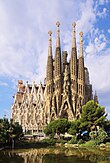Llotja: Difference between revisions
ILoveCaracas (talk | contribs) No edit summary |
ILoveCaracas (talk | contribs) No edit summary |
||
| Line 2: | Line 2: | ||
'''Llotja''' ({{IPA-ca|ˈʎɔdʒə|ec}}, {{IPA-ca|ˈʎɔdʒa|wc}}, plural {{lang|ca|''llotjes''}}); in {{lang-an|loncha}}; in {{lang-es|lonja}}; is a Spanish term for important buildings used for commercial purpose during the [[Middle Ages]] and [[Early Modern period|Early Modern Ages]]. |
'''Llotja''' ({{IPA-ca|ˈʎɔdʒə|ec}}, {{IPA-ca|ˈʎɔdʒa|wc}}, plural {{lang|ca|''llotjes''}}); in {{lang-an|loncha}}; in {{lang-es|lonja}}; is a Spanish term for important buildings used for commercial purpose during the [[Middle Ages]] and [[Early Modern period|Early Modern Ages]]. |
||
Most them, were the earliest used for fishing and livestock markets or by brokers who used to make intermediaries. |
|||
The others, that were called [[Casa de Contratación|Casa de Contratación de Indias]], were establishments destined to the control of the commercial activity, the transit of people and expeditions between Spain and the Americas. They registered all of the merchandise that circulated between Spain and the Americas and intervened in commercial trials. |
The others, that were called [[Casa de Contratación|Casa de Contratación de Indias]], were establishments destined to the control of the commercial activity, the transit of people and expeditions between Spain and the Americas. They registered all of the merchandise that circulated between Spain and the Americas and intervened in commercial trials. |
||
Revision as of 11:19, 12 February 2018
Llotja (Catalan pronunciation: [ˈʎɔdʒə], Catalan pronunciation: [ˈʎɔdʒa], plural [llotjes] Error: {{Lang}}: text has italic markup (help)); in Template:Lang-an; in Template:Lang-es; is a Spanish term for important buildings used for commercial purpose during the Middle Ages and Early Modern Ages.
Most them, were the earliest used for fishing and livestock markets or by brokers who used to make intermediaries.
The others, that were called Casa de Contratación de Indias, were establishments destined to the control of the commercial activity, the transit of people and expeditions between Spain and the Americas. They registered all of the merchandise that circulated between Spain and the Americas and intervened in commercial trials.
Llotjes from the former Crown of Aragon
- Llotja de Barcelona or Llotja del Mar, (1352–1453) (reformed 1774–1802).
- Llotja de Castelló d'Empúries (c. 1393).
- Llotja de Tortosa (1368–1373).
- La Porxada (1587) in Granollers.
- Loncha de Sos del Rey Católico (15th century).
- Loncha de Alcañiz (15th century).
- Loncha de Zaragoza (1541–1551).
- Casa Consistorial de Tarazona (1563), formerly it was a llotja, the same building become in mid-17th century in the Town Hall.
- Llotja de Valencia, also called Llotja de la Seda (1482 and 1492). It is a UNESCO World Heritage Site.
- Llotja del Cànem (17th century) in Castellón de la Plana.
- Town Hall of Ares del Maestrat (1295-1318), a former llotja, now the Town Hall.
- Llotja de Palma or Sa Llotja, (1420–1452).
- Loge de Perpignan (14th–16th centuries) currently inside France.
Llotjes in the rest of Spain
- Antigua Lonja (18th century) in El Puerto de Santa María.
- Lonja de San Felipe or Las gradas de San Felipe (16th c.), now demolished, was in Madrid.
- Casa Lonja de Alzola (17th century) in Elgoibar.
Casas de Contratación
The Casa de Contratación de Indias centralized all of trade of the Americas with Spain from 1503 to 1790, including all types of products. Its headquarters were:
- Seville Dockyards, was the first seat for the Casa de Contratación de Indias.
- General Archive of the Indies in Seville, was the most important seat for the Casa de Contratación de Indias.
- Alcázar of Seville, was other seat for the Casa de Contratación de Indias.
- Casa Palacio del Marqués de Torresoto in Cádiz, was the last seat for the Casa de Contratación de Indias.

